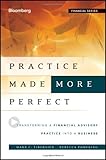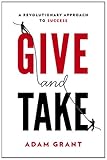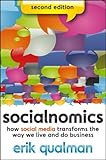Executive Summary
As the school season wraps up around the country, it's time for summer vacations to get underway, and along with them a lot of time for relaxing and reading books.
As an avid reader myself, I know I'm always eager to hear suggestions of good books to read, and I suspect many of you are often looking for ideas as well. Accordingly, I'm sharing my own list of 10 "summer reading books for financial planners" (at least, for those of you who are up for reading non-fiction books for fun!), from business and professional self-improvement books to the latest in behavioral finance and investment theory.
I hope you find this book list to be helpful... and that you share your own suggestions of what you're reading in the comments at the end of this blog post!
Checklist Manifesto - As the name implies "Checklist Manifesto" is a manifesto by its author about the importance and value of checklists, written by a doctor named Atul Gawande who was a driver in the creation of the World Health Organization's "Safe Surgery Checklist" which is estimated to be capable of saving half a million lives around the world with effective implementation. While written in the context of medicine, the book has relevance for any profession which includes extensive advanced technical knowledge that must be applied in a wide range of circumstances, from medicine to building construction to financial planning. In complex situations, checklists help to ensure that nothing is overlooked, and that best practices are applied consistently. In fact, as I wrote a few months ago, I was certainly persuaded that checklists are underutilized in financial planning (including our own practice) after reading the book, and we have since started an internal effort to improve on this.
Practice Made (More) Perfect - Although not quite "new" (it came out in 2011), this book by practice management experts Mark Tibergien and Rebecca Pomering take a deep dive into how to transition a personal financial planning practice into a bona fide business. As financial advisory firms continue to grow larger and more complex, Tibergien and Pomering make the point that most advisors, as business owners, are not well equipped to manage the increasingly complex businesses they've created, and this book tries to help bridge the gap. An updated version of their original "Practice Made Perfect" book from 2005, this book provides some great perspective on how to manage the growth and transitions as your planning practice grows. For those who are a bit more focused on exiting their practice rather than building it larger, a good alternative book to read is Tibergien's "How To Value, Buy, Or Sell A Financial Advisory Practice" instead.
Stop Asking For Referrals - In what was probably the most important new book for financial advisors in 2012, Marketing consultant Stephen Wershing explains how the real key to better referral marketing is not to ask for referrals more often, but instead to ask for them less and focus instead on what it takes to make yourself more referrable in the first place. Wershing rejects the notion that most clients refer an advisor for the benefit of the advisor, and makes the point that instead most people actually refer their advisor to provide a solution for the friend to whom they're making the referral. Accordingly, the real key to getting more referrals is to more clearly identify what your solutions are, and who they're best for, to make it easier for clients to know exactly when and where to refer you. In a world where research indicates that 91% of clients are willing to give a referral, but only 29% actually do, and only 2% of them respond they did so at the request of their advisor, Wershing's book provides a whole new perspective on how to really build a referral-based growth strategy for your advisory firm.
Give and Take - Written by Wharton management professor Adam Grant, "Give and Take" provides an interesting perspective on what leads to success, noting that ultimately most people interact in one of three styles: Givers, Matchers, and Takers. As the names imply, Takers try to take as much as possible from every interaction, Matchers tend to open on a "tit for tat" basis where favors are collected and repaid, while Givers simply tend to give to others without creating an expectation of anything in return. As one might imagine, Grant's research has found that Givers often appear at the bottom of the success ladder, as they are consistently abused by Takers and never manage to advance themselves. However, surprisingly Grant found that when looking at the top of the success ladder, Givers appear again - a rare subset of them who have figured out how to balance their Giving style with also watching out for themselves. Ultimately, this book provides some great ideas about how to better shape the path of your own success, and in a profession like financial planning, that has a lot of Givers, may resonate especially well with some!
Getting Naked - Though not a new book (it actually came out back in 2010), I believe Patrick Lencioni's "Getting Naked" should be mandatory reading for all financial planners trying to provide financial advice to their clients. The book highlights how most people in consulting - which would include planners - ultimately hinder themselves by fixating on three fears: the fear of losing business, the fear of being embarrassed, and the fear of being inferior. Yet Lencioni finds that turning those fears upside down, and being willing to make yourself vulnerable, admit ignorance, and ask "dumb" questions, is ultimately the key to really delivering value, and more importantly to effectively building client trust through transparency. The book is a very light and easy read, as Lencioni makes his points in the form of a narrative story about how a small consulting firm beats out its big name competitors by not holding back because of its fears.
To Sell Is Human - Continuing the theme of advancing your own success, "To Sell Is Human" by bestselling author Daniel Pink looks at the noble side of selling and sales, which ultimately is just about influence and persuasion; as a result, good "sales" skills are as relevant in a professional services context, as a more "traditional" path like selling products. In fact, Pink's message about the importance and value of sales skills is arguably especially relevant for financial planners, as ultimately planners must both persuade clients to pay for their services, and ultimately persuade clients to implement those recommendations. In a world where the word "sales" has a negative stigma, and is often viewed as an opposite to the fiduciary direction of financial planning, Pink's book makes an interesting case that, as I wrote earlier this year, even fiduciary financial planning is all about sales, sales, and sales.
Socialnomics - Erik Qualman's "Socialnomics" was the book that first really opened my eyes and helped me to understand the potential of social media to impact the world of business; although not written for financial planners, its discussion of how word-of-mouth marketing (i.e., referrals) is changing due to social media connected immediately with me. If you're not certain what all the hub-bub of social media is about, or you've been doing it a bit but the value and benefits haven't quite coalesced yet, you should find Socialnomics helpful to better understand what it is you're working towards. The book first came out several years ago, but Qualman just released a second edition late last year, updated to the current social media environment, and with more case studies to show examples of how social media is being implemented effectively. You can also see Qualman's latest "Social Media Revolution" video here.
The New Digital Age - Written by Google chairman Eric Schmidt and geopolitical analyst Jared Cohen, this book takes a deep - and sometimes dark - dive into how the world will really change in the coming digital age, as the explosion of smartphones will soon put access to the internet in the hands of almost every person in the world. On the one hand, this will lead to an incredible increase in interconnectedness of the world, and amazing business opportunities, as even a local fisherman in a rural village might be able to adjust which town he walks his fish to market depending on an app on his smartphone to tell him where he can fetch the best price. Yet at the same time, the explosion of digital has significant ramifications in a geopolitical context, as witnessed with the role that mobile device communication played in the Arab Spring just a few years ago, and the ways that government can begin to intrude into the lives of citizens... as the book notes indirectly, if you think the recent NSA controversy has been concerning, imagine how a government might use the internet to watch its citizens in a country that is headed by a not-so-benevolent dictator, rather than in a democracy! This book isn't so much about how the devices of the digital age may change the way we live our day-to-day lives, but a much deeper perspective on how the growth of the internet may begin to entirely reshape global business and global politics.
Thinking, Fast & Slow - This book is Nobel Prize winner Daniel Kahneman's tour de force synopsis of several decades' worth of behavioral finance research. Kahneman starts out by explaining the fundamental way that our brains think, with two overlapping systems: the first is fast, intuitive, and emotional, while the second is slower, rational, and logical. While we like to think that we make most of our decisions with the latter, the reality is that an extraordinary amount of decision-making occurs through the former; in fact, sometimes even when we believe we have thought the issue through using System 2, the research reveals that in reality it was the fast System 1 that made the decision, and System 2 just came up with a rationalization after the fact! Kahneman slowly and methodically walks through each of the major aspects of research into how our brains work; while the depth of the book does make it a bit slow at times, you'll see client behaviors reflected in one chapter after another after another... and hopefully glean a few ideas in the process of better understanding why our clients' brains sometimes tick the way they do!
Antifragile - The latest from Nassim Taleb, author of the now-famous "The Black Swan" (though he first used in the term in his prior book "Fooled By Randomness" which I've always thought was the better of the two!), this book goes beyond Taleb's prior work in just looking at how our world is impacted by improbable and unpredictable (i.e., "black swan") events, and instead puts forth the concept of "antifragile" to connote systems that not only can be resilient and survive unexpected shocks, but actually grow stronger from them. I will confess that I have not yet read Antifragile myself - as is the purpose of this list, this book really is on my own summer reading list to get through. While Taleb's concepts are sometimes difficult to put into practice - and anecdotally, I've heard that some criticism of this book that it's not entirely clear how to apply the concepts in a practical manner - this book nonetheless ranks high on my list as a book that will challenge me to think in different and new ways about the investment, economic, and financial planning challenges we face in our world today.
So what do you think? Will you be reading any of these books over the summer? Do you have any suggestions of your own that you're willing to share? Please speak up in the comments below!















I have read most of each of the following and recommend them:
Nate Silver’s “The Signal and the Noise: Why So Many Predictions Fail-But Some Don’t. Good analysis of predictions that are financially related, as well as not financial.
The Alchemists: Three Central Bankers and a World on Fire, by Neil Irwin; great primer on central banking system origins and how the central bankers acted since 2007. Well worth the background and author explains things that we have just gone through, but from the inside.
The Quest: Energy, Security and the Remaking of the Modern World, Daniel Yergin, 2012; A huge book that provides background to various sources of energy, how international companies are working together throughout the world, future energy sources, fracking. A long but worthwhile read.
Great choices Michael, especially “Stop Asking for Referrals,” and “Thinking Fast and Slow,” both of which I’ve read.
As always, a well thought out and well-rounded list, Michael.
Here are three recent books that I’ve found to be worthwhile:
1) Get Clients Now, Third Edition by CJ Hayden. Does an excellent job of laying out both the big picture strategies and day-to-day tactics of how to win clients. Includes plenty of templates, examples, and worksheets.
2) Technology Tools for Today’s High-Margin Practice; edited by David Drucker and Joel Bruckenstein. Drucker and Bruckenstein gave their contributors carte blanche to write on whatever technology topic they chose so there is a good variety of topics covered here. Most contributors did a good job of focusing on evergreen content as technology evolves very quickly. I found the Davis Janowski and Marie Swift chapters to be the most applicable to my situation.
3) So Good They Can’t Ignore You by Cal Newport. Rejects the traditional career advice of finding your passion and instead posits that you need to work long and hard to develop a skillset that people will pay money for. Deena Katz did a great book review in February’s Financial Planning magazine.
Thank you so much for the list.
I read the Checklist Manifesto a couple of years ago. It is a very long winded way of saying “USE CHECKLISTS”. Which indeed is very important for advisors. It is interesting (good stories), but each story simply supports the recommendation to use checklists.
I would add “Power Questions: Build Relationships, Win New Business, and Influence Others”. It is one of the best books for asking great questions at the right time to build/deepen client relationships – and beging a better advisors.
Thanks again!
So far, my favorite book of 2013 is the Heath brothers’ latest – “Decisive: How to Make Better Choices in Life and Work”. It’s similar in format to some of their previous work (“Switch” in particular) in that they use interesting stories & memorable concepts supported by research studies. It’s fascinating and incredibly practical in helping clients make better decisions.
I’m currently reading Wershing’s book which is also excellent & thought provoking. Pink’s book is next on my list.
I’ve read most of the books on your list Michael, and concur with other readers that this is a useful mix of books to have in one’s library. I’m particularly looking forward to reading ‘Getting Naked’ and ‘Give and Take’ the latter has been on my reading list for a few months now.
I think the list would benefit from some books about communication. In my opinion we’re as much in the communications business as we are in the planning business. But the books on my list are now a few years old – does anyone have any recent recommendations about communicating better, to achieve beter outcomes?
Other books that are making an impact for me right now are – Simon Sinek’s ‘Start With Why’ and Jack Stack’s ‘A Stake in the Outcome’ which should be of interest to anyone thinking of enabling employees to take shares in their practice.